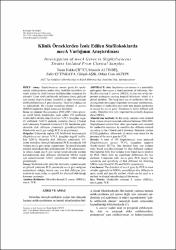Klinik örneklerden izole edilen stafilokoklarda mecA varlığının araştırılması
Abstract
Amaç: Staphylococcus aureus geniş bir spektrumda
enfeksiyonlara neden olan, özellikle metisiline dirençli
suşları ile ciddi hastane enfeksiyonları oluşturan bir
etkendir. Uzun süreli antibiyotik kullanımı direnç gelişimi
için önemli olup bu direnci (metisilin ve diğer beta-laktam
antibiyotiklere) mecA geni oluşturur. Tedavisi oldukça zor
ve maliyetlidir. Bu yüzden metisiline dirençli S. aureus
(MRSA) suşlarının doğru tanısı çok önemlidir.
Gereç ve yöntem: Bu çalışmaya 2004-2005 yılları arasında
çeşitli klinik örneklerden izole edilen 193 stafilokok
izolatı dahil edilmiş olup (S.aureus %79.3, koagülaz negatif
stafilokok %20.7) suşlarda metisilin direnci Clinical
and Laboratory Standards Institute (CLSI) önerilerine göre
oksasilin disk difüzyon yöntemiyle gerçekleştirilmiştir.
Örneklerde mecA gen varlığı PCR ile araştırılmıştır.
Bulgular: Çalışmada toplam 193 Stafilokok incelenmiştir
(Staphylococcus aureus %79.3, koagülaz negatif stafilokok
%20.7). Oksasilin disk difüzyon yöntemiyle 141
izolat metisiline dirençli bulunurken PCR metoduyla 144
izolatta mecA gen varlığı saptanmıştır. İki metod arasında
anlamlı istatistiksel fark görülmemiştir. PCR çalışmalarıyla
ortaya konan mecA gen varlığı temel alınarak yapılan
karşılaştırmada disk difüzyon yönteminin MRSA tespiti
için sensitivitesinin %96.5, spesifitesinin %96.0 olduğu
gözlenmiştir.
Sonuç: Stafilokoklarda metisilin direncinin saptanmasında
en güvenli yöntemin PCR yardımıyla mecA gen varlığının
araştırılması olduğu, bunun yanı sıra disk difüzyon yönteminin
de ucuz, kolay ve spesifik bir alternatif olabileceği
kanısına varılmıştır. Aim: Staphylococcus aureus is a potentially
pathogenic that causes a board spectrum of infections. Methicillin
resistant S. aureus (MRSA) is also one of the important
pathogens causing hospital infections, which is a
global problem. The long time use of antibiotics this microorganism
developed important resistance mechanisms.
Resistance to methicillin and other beta-lactam antibiotics
is caused by mecA gene. Treatment is fairly difficult and
costly. Therefore it is very important to correctly diagnose
these MRSA.
Material and methods: In this study, samples were isolated
from various clinical materials collected between 2004-2005.
Staphylococci isolated from clinic speciments were screened
for methicillin resistance by oxacillin disc diffusion method
according to the Clinical and Laboratory Standards Isntitue
(CLSI) guidelines. Afterwards all strains were tested for the
presence of the mecA gene by PCR.
Results: A total of 193 Staphylococci were analyzed
(Staphylococcus aureus 79.3%, coagulase negative
Staphylococci 20.7%). One hundred forty one isolates
were found oxacillin-resistant by disc diffusion method.
One hundred forty four isolates were found mecA positive
by PCR. There were no significant differences for two
methods. Compared with, mecA gene PCR assay's the
sensitivity and specificity of disk diffusion for detecting
MRSA were found 96.5% and 96.0% respectively.
Conclusion: The detection of mecA gene by PCR is most
reliable approach for MRSA, nevertheless disc diffusion is
quite useful and specific method which can be used as a
method in clinical microbiological laboratory.
Source
Afyon Kocatepe Üniversitesi, Kocatepe Tıp DergisiVolume
10Issue
1-2-3Collections
- Makaleler [452]



















